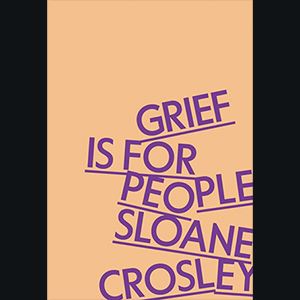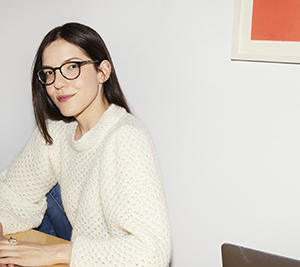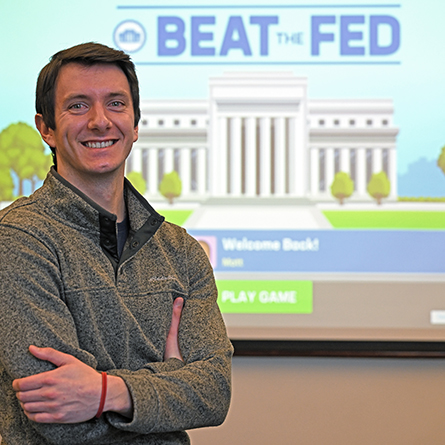
‘Grief Is For People’: Author Sloane Crosley ’00 tells the story of how she endured a particularly harrowing year

Even though she grew up just a short train ride from New York City, Sloane Crosley ’00 recognizes it takes a particular commitment to make the Empire City home.
“There’s financial hardships, emotional hardships,” says the New York Times bestselling author. “It’s difficult. It catches up with us all eventually, and we must decide to make this place ours and find our place within it.”
In her new book, Grief Is For People, Crosley explores the kinds of blows the Greatest City in the World—and life itself—can deal you. In a painful pileup, she lost a close friend, the book publicist Russell Perreault, to suicide and had her apartment burgled. Then, she had to watch as the world just outside her window sank into a pandemic.
“I would say it is a book about loss and grief and the sort of uneven topography of that experience, as told through the prism of someone usually known to be a humor writer,” she reflects. “It’s about these two successive events, these gradually increasing losses. It’s these sorts of ever-increasing circles of loss and how they all connect.”
Crosley continues, “I think the other thing that book is really about is trying to figure out where certain kinds of mourning belong and who gets to mourn and over what, so it’s a little bit about that struggle between figuring out what’s a big deal and what’s not.”

Among all these heavy topics, it can be easy to forget that Crosley is an extremely funny author. Her essays, including those in the collections I Was Told There’d Be Cake, How Did You Get This Number and Look Alive Out There, and novels, including The Clasp and Cult Classic, are replete with sly observations and outright guffaw-inducing punchlines. In Grief, that humor still saturates her prose.
“It’s how I express myself,” says Crosley. “I’m not saying I’m the funniest person in the world, but it is what I have. I’ve read things from other writers on similar topics, and they’re startlingly beautiful. I find myself somewhat envious of that. But I’ve realized these are the tools I use to get to the same topic and drill down to the core of it. They’re funny, and they’re not pretty.
“Humor became part of the scenery of what it’s like to grieve and what it is like to go through these experiences. Grief Is for People is really my attempt to imitate that strange rollercoaster of grief. And sometimes that includes this dark humor. The person who I really love most dies in this horrible way. I am deeply unlucky that this incredibly funny person died. But, when it comes to a book, I am incredibly lucky. Because now you have two inappropriate people driving this car.”
With the book complete and about to hit shelves Feb. 27, Crosley must next head out on tour to promote Grief. When asked how she feels about looking back on both the person she was when she lived through 2019/2020 and when she wrote the book, it is evident that Crosley considers that a challenge.
“First of all, this is going to sound like a politician filibustering, but I genuinely am so glad you asked that question,” she says with a laugh. “I feel sometimes unqualified to talk about my books because of how long it takes to produce a book. In the case of Grief Is for People, that anxiety, that apprehension that I’m slightly removed from it is actually incredibly pronounced.”
To further explain herself, she turns to the author she describes as her “personal bard,” Truman Capote.
“I think Capote had a quote about how writers should only start after their tears have dried. Not to disagree, but I feel like maybe the tears are dry but the tissues are still wet. You have to find that point. I’m not the biggest fisherwoman, which I am sure will surprise the readers of CC Magazine, but I know that there’s certain kinds of fly fishing where you are trying to attract a fish and then there’s others where you’re almost just trying to get in the way of the fish. And I feel like nonfiction personal writing is like that. It’s about the timing. If I were to start writing this book now, I don’t think I could do it.”
Nonetheless, she welcomes the chance to share her books with others and the stories they will, in turn, share with her. And when she returns to the Big Apple, well, she’ll be as pleased as ever to call it home.
“Staying through the sort of horrific death of a dear friend who so represented New York to me and my whole life here and staying through COVID—I never actually left,” Crosley reveals. “Those experiences bonded me to the city more.”
